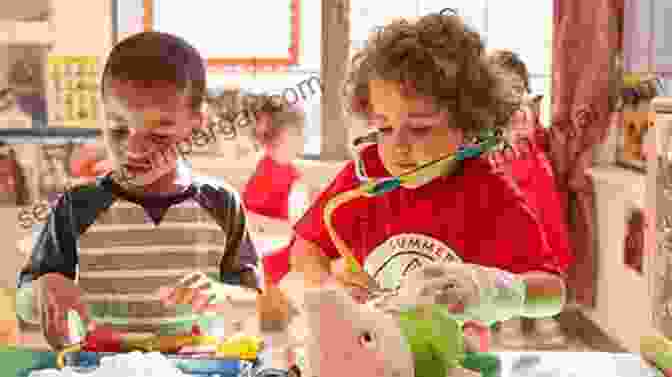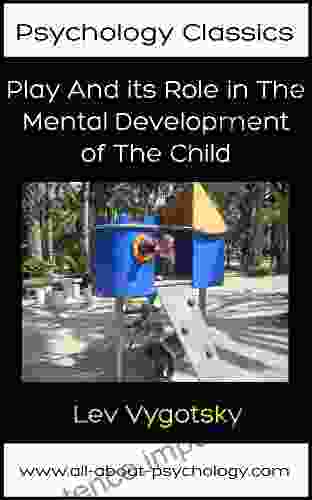Play And Its Role In The Mental Development Of The Child: A Journey into Psychology Classics

: The Enchanting World of Play

4.2 out of 5
| Language | : | English |
| File size | : | 298 KB |
| Text-to-Speech | : | Enabled |
| Screen Reader | : | Supported |
| Enhanced typesetting | : | Enabled |
| Word Wise | : | Enabled |
| Print length | : | 24 pages |
| Lending | : | Enabled |
Play is an inherent part of childhood, an enchanting world where children explore, discover, and make sense of their surroundings. It is not merely a frivolous activity; rather, play holds immense significance for the mental development of children. Throughout history, psychologists have recognized the profound impact of play on cognitive, emotional, social, and physical well-being.
Piaget's Theory of Cognitive Development: Play as a Catalyst for Learning
Jean Piaget, a renowned Swiss psychologist, believed that play is a crucial aspect of cognitive development. According to his theory, children progress through four distinct stages of cognitive development: sensorimotor, preoperational, concrete operational, and formal operational. Play, particularly imaginative play, plays a pivotal role in each stage, fostering children's understanding of the world and their place within it.
- Sensorimotor stage (birth to 2 years): Young children engage in sensory and motor activities, exploring their environment through touch, taste, smell, and movement. Play during this stage aids in the development of object permanence, the understanding that objects continue to exist even when out of sight.
- Preoperational stage (2 to 7 years): Preschool-aged children exhibit egocentrism, perceiving the world solely from their own perspective. Play helps them develop symbolic thinking, the ability to represent objects and ideas with words and symbols.
- Concrete operational stage (7 to 11 years): Children become more logical and less egocentric. Play encourages the development of conservation, the understanding that physical properties of objects remain unchanged despite changes in their appearance.
- Formal operational stage (11 years and up): Adolescents develop abstract thinking and hypothetical reasoning. Play supports the growth of critical thinking, problem-solving, and decision-making abilities.
Vygotsky's Sociocultural Theory: Play as a Social Learning Tool
Lev Vygotsky, a Russian psychologist, emphasized the social and cultural context of play. He believed that play is a primary means through which children learn about their culture and develop their social skills. Vygotsky's theory highlights the importance of:
- Zone of proximal development: The range of tasks that a child cannot do independently but can master with the guidance of a more skilled peer or adult. Play provides an ideal setting for children to explore this zone and develop new skills.
- Peer interaction: Play encourages children to interact with peers, fostering social development. Through play, they learn to cooperate, negotiate, share, and resolve conflicts.
- Language development: Play stimulates language development, as children engage in imaginative dialogue and storytelling.
Erikson's Psychosocial Theory: Play as a Path to Identity Formation
Erik Erikson, an American psychologist, proposed a theory of psychosocial development that encompasses eight stages. Erikson believed that each stage presents a unique conflict or challenge that individuals must navigate to achieve psychological well-being. Play serves a significant role in resolving these conflicts:
- Initiative vs. guilt (3 to 6 years): Play allows preschoolers to assert their independence and explore their interests. It helps them develop a sense of self-determination.
- Industry vs. inferiority (6 to 12 years): Play fosters a sense of competence and accomplishment in school-aged children. It encourages them to develop their skills and discover their strengths.
- Identity vs. role confusion (adolescence): Play provides a safe space for adolescents to experiment with different roles and identities, leading to a coherent sense of self.
Practical Applications: Harnessing the Power of Play
Understanding the profound impact of play on children's mental development, we can harness its power to promote healthy child development. Here are some practical applications:
- Provide unstructured play time: Allow children ample opportunities for unstructured play, both indoors and outdoors. This fosters creativity, imagination, and problem-solving skills.
- Encourage imaginative play: Encourage children to engage in imaginative play, such as pretend play, storytelling, and dress-up. These activities stimulate language development, cognitive flexibility, and social skills.
- Facilitate social play: Create opportunities for children to interact and play with peers. Social play enhances cooperation, communication, and conflict resolution abilities.
- Use play in therapy: Play therapy is an effective approach to address developmental, emotional, and behavioral issues in children. It utilizes play as a medium for expression, exploration, and healing.
: Play as the Cornerstone of Child Development
Play is not simply a pastime; it is an indispensable aspect of child development. Through play, children explore, learn, grow, and develop a sense of self. By recognizing and harnessing the power of play, we can foster the mental, emotional, social, and physical well-being of our children, nurturing their potential and setting them on a path to lifelong success and fulfillment.
Embrace the enchanting world of play and unlock its profound benefits for the mental development of our children. Let us provide them with the space, opportunities, and encouragement to play, fostering their creativity, curiosity, and lifelong love for learning.
4.2 out of 5
| Language | : | English |
| File size | : | 298 KB |
| Text-to-Speech | : | Enabled |
| Screen Reader | : | Supported |
| Enhanced typesetting | : | Enabled |
| Word Wise | : | Enabled |
| Print length | : | 24 pages |
| Lending | : | Enabled |
Do you want to contribute by writing guest posts on this blog?
Please contact us and send us a resume of previous articles that you have written.
 Book
Book Novel
Novel Page
Page Chapter
Chapter Text
Text Story
Story Genre
Genre Reader
Reader Library
Library Paperback
Paperback E-book
E-book Magazine
Magazine Newspaper
Newspaper Paragraph
Paragraph Sentence
Sentence Bookmark
Bookmark Shelf
Shelf Glossary
Glossary Bibliography
Bibliography Foreword
Foreword Preface
Preface Synopsis
Synopsis Annotation
Annotation Footnote
Footnote Manuscript
Manuscript Scroll
Scroll Codex
Codex Tome
Tome Bestseller
Bestseller Classics
Classics Library card
Library card Narrative
Narrative Biography
Biography Autobiography
Autobiography Memoir
Memoir Reference
Reference Encyclopedia
Encyclopedia James S Shapiro
James S Shapiro James J Sheehan
James J Sheehan James P Delgado
James P Delgado Jane Fields
Jane Fields Jake Wood
Jake Wood Jane Thompson
Jane Thompson James J Nedumpara
James J Nedumpara Janneke Vreugdenhil
Janneke Vreugdenhil Jeanne D Petit
Jeanne D Petit Janet Bond Brill
Janet Bond Brill Jasmine Taylor
Jasmine Taylor Jameel Jaffer
Jameel Jaffer James Sullivan
James Sullivan James Sully
James Sully James Epstein
James Epstein Jeannie Freis
Jeannie Freis Jay Gurden
Jay Gurden Jeff Alulis
Jeff Alulis James Freeman Clarke
James Freeman Clarke Jay Kidwell
Jay Kidwell
Light bulbAdvertise smarter! Our strategic ad space ensures maximum exposure. Reserve your spot today!

 Colt Simmons21 Blackjack Strengths To Beating The Dealer: Chess Tactics Strategy Revealed
Colt Simmons21 Blackjack Strengths To Beating The Dealer: Chess Tactics Strategy Revealed Gabriel Garcia MarquezFollow ·18.4k
Gabriel Garcia MarquezFollow ·18.4k Efrain PowellFollow ·7.3k
Efrain PowellFollow ·7.3k Stephen KingFollow ·7.4k
Stephen KingFollow ·7.4k Albert ReedFollow ·11.3k
Albert ReedFollow ·11.3k Eliot FosterFollow ·10k
Eliot FosterFollow ·10k Bernard PowellFollow ·16.8k
Bernard PowellFollow ·16.8k Christian BarnesFollow ·13.2k
Christian BarnesFollow ·13.2k Isaac BellFollow ·4.6k
Isaac BellFollow ·4.6k

 Jacob Foster
Jacob FosterPrinciples and Persons: The Legacy of Derek Parfit
Derek Parfit's 1984 book,...

 Leo Mitchell
Leo MitchellPartners For Life: Raise Support For Your Missionary Work...
Are you a missionary or ministry leader...

 Blake Kennedy
Blake KennedyOn Desperate Ground: A Gripping Account of World War II's...
Hampton Sides' "On...

 Duane Kelly
Duane KellyCriminal Minds Sociopaths Serial Killers And Other...
In the realm of criminology,...

 Craig Blair
Craig BlairHome Repair: The Ultimate Guide to Fix, Maintain, and...
Welcome to the...

 Elmer Powell
Elmer PowellThe Organic Grower Guide to Mycorrhizae Science for...
Unlock the Secrets of Soil...
4.2 out of 5
| Language | : | English |
| File size | : | 298 KB |
| Text-to-Speech | : | Enabled |
| Screen Reader | : | Supported |
| Enhanced typesetting | : | Enabled |
| Word Wise | : | Enabled |
| Print length | : | 24 pages |
| Lending | : | Enabled |










